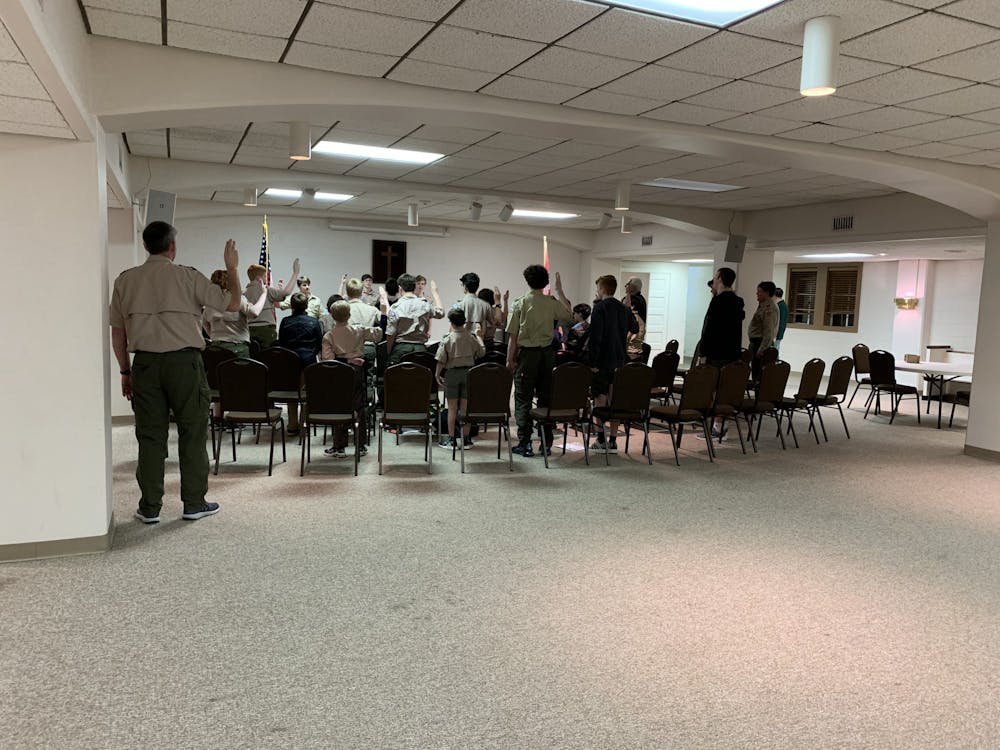Troop 50 met in the carpeted basement of First Presbyterian Church on Feb. 24, just like they do every Monday night. There was the same routine to start off the night: the presentation of the flag, recitation of the Pledge of Allegiance, chanting of the Scout oath.
In some regard, though, this meeting was different. It was one week after it was announced that the Boy Scouts of America were filing for bankruptcy, a move caused in part by the financial instability that has resulted from hundreds of sex-abuse lawsuits waged against the organization.
But things in Troop 50 remained largely the same. The meeting continued as planned, as one Scout led the troop in prayer:
“God … look after those in need.”
I. Not Here
Thousands of victims have come forward in lawsuits against the Boy Scouts of America, alleging that they had been sexually abused by a leader within their troop. The organization currently faces about 300 lawsuits, NPR reported.
The BSA made its Chapter 11 bankruptcy filing on Feb. 18, which will allow the group to continue operating as it tries to address its future. BSA has said that, through the Chapter 11 process, a trust will be established to provide compensation to survivors.
While BSA is in the midst of bankruptcy, local troops and the councils that govern them will go largely unaffected, at least directly, according to Troop 50 Assistant Scoutmaster Michael Tullier.
Tullier said he always explains that Scouts is organized like a franchise, where BSA, the national organization, is the main company and that the troops are the relatively-independent agents of the company. In between troops and BSA are councils, which assist troops and foster communication and activities between troops.
“Through the franchise model, as the way I understand it, there’s not a lot of connected finances,” Tullier said. “It’s not like our council pays money up or back and forth.”
Jonathan Middleton, Scoutmaster for Troop 371, another troop in Auburn, said the Chattahoochee Council, to which both Troop 371 and Troop 50 belong, won’t be affected “in any sort of direct way,” because it is a legally separate and financially independent entity from BSA.
This means that the properties that the Chattahoochee Council owns, like Camp Pine Mountain in West Point, Georgia, will be protected from any sort of forfeiture related to the bankruptcy and pending lawsuits. The BSA has, however, put up its Philmont Scout Ranch in New Mexico as a liability in the bankruptcy, which makes up only a portion of BSA’s total assets, which exceed $1 billion.
The lawsuits that have gained national attention were not filed against local troops, but against the national organization.
Tullier and Middleton both said they don’t believe any issues have arisen in either Auburn troop throughout their history. The Lee County Justice Center has no record of charges pressed against either local troop.
“I don’t know that I’ve ever been in a situation where I’ve looked at another leader questioningly,” Tullier said. “I've had sons in scouting, two of them, and I've never really questioned another leader’s motives.”
Part of the reason that both Tullier and Middleton believe that their troops have avoided instances of abuse is that family involvement in both troops is very high.
“This is a family environment, at least that’s how we approach our troop,” Tullier said. “[Parents] stay at our meetings, they get to know our leaders, and we encourage that, because … scouting isn’t daycare. We’re not here to watch kids for an hour and a half each week.”
Tullier added that Scouts, parents and leaders often know each other from church, school or work, creating a second layer of accountability that might not exist in larger troops.
There were several parents at the meeting at First Presbyterian on Monday night, sitting in a pew against a basement window. Most clearly knew each other, but several parents were there for the first time, as their child moved on from Cub Scouts to Boy Scouts. Many Scouts have continued to move from Boy Scouts to Cub Scouts in Auburn despite national trends that show dwindling enrollment numbers in Scouts nationwide.
“Fortunately in our area, I think scouting has been pretty widely positively viewed,” Tullier said. “As you've seen, we've had new scouts looking to move from Cub Scouts to Boy Scouts and continue that program.”
Most Scout parents, including those of new Scouts, seemed to be unbothered by the lawsuits facing BSA. Travis Sisson, whose son is a member of Troop 371, said the current state of the national organization doesn’t really affect his view of his son’s involvement, because any effect on the troop will be minimal.
Max Crook, a Troop 371 Scout, said because most of the cases in the lawsuit occurred over 25 years ago, he doesn’t see how it would affect him or his troop.
Parents and Scouts didn’t really make much of a fuss when Troop 50 Scoutmaster Andrew Baird told them about what BSA’s bankruptcy and the surrounding allegations, Tullier said. He understood the parents’ perspective to not get upset “if it’s not in your backyard.”
”We try to continue to emphasize the positive about the program we deliver,” Tullier said. “We really haven’t been together much as a troop since the announcement came out. The boys haven’t really asked too many questions.”
II. A Specter
While BSA’s bankruptcy ultimately will not directly affect the local troops, the condition of the parent organization still brings up emotions for members.
“It’s a very unfortunate situation,” Tullier said. “I would never want to know that one of my friends had been mistreated. I wouldn’t want to know that my kids, who have been through the scouting program, had been mistreated.”
The decision to declare bankruptcy did not come as a surprise to some Scout leaders.
“I’ve known for a while. This was not a surprise to me,” Middleton said. “I'll say this: I got an email from our Council, informing us that it actually happened. The rumors had been around for months.”
BSA had been considering bankruptcy as a solution since at least December 2018, according to NPR. In 2012, a court ordered that BSA release confidential “perversion files” that contained the names of over 7,000 perpetrators of some form of abuse, according to the Atlanta Journal-Constitution.
For a long time, no one really ever wanted to talk about sex abuse.
“Looking back, I think when I was a scout ... a lot of [abuse], I think, just wasn't in the forefront. A lot of that stuff just wasn’t talked about,” said Rob Stanford, Troop 50 committee chairman.
These instances of abuse arose, Tullier said, mostly because of an imbalance in power between Scouts and their leaders, “just like any vulnerable population.”
“Whatever the situation might be, I think [abuse occurs] when an individual is unable to speak and advocate for themselves, and they're put in a situation where they’re in the care of what should be a trustworthy adult,” Tullier said.
New policies, like restraints on digital communication and a more stringent hiring process, have been put in place over the years as a way to prevent more kids from being victimized. The national organization also encouraged parents to get more and more involved over the years to help protect and advocate for their children.
“These changes, it’s the way we can talk to these guys, and it’s a direct result of what happened 35 years ago,” Middleton said. “All this abuse and stuff helped create what is called Youth Protection Training, which we all have to take.”
All leaders of Scout troops must complete Youth Protection Training, an educational and informative training session that includes a “three-hour test” that must be taken every few years for leaders to continue serving in their troop. Middleton feels that what BSA requires of leaders goes beyond what’s required of other organizations that work with children.
“I also believe that Scouts nowadays does more to protect these guys than anybody else does, and that includes churches,” Middleton said. “They go beyond what was expected. You know, you don’t hear that from rec league coaches … I know enough rec league coaches that don’t have to do all that stuff.”
For Middleton, operational changes are the best way to address problems from the past, for the most part. These lawsuits, he feels, are unfortunate for the organization but ultimately inevitable, saying, “that’s just the day and age we’re in.”
“People who were truly victimized, there’s no doubt that they should be taken care of, to a certain degree,” Middleton said. “I know that the BSA is doing everything they can to make sure that anybody that was a victim from 30 plus years ago … has been taken care of, as far as going through therapy and things of that sort.”
Tullier said these lawsuits and the bankruptcy are a way to formally, and finally, directly confront the sex abuse that occurred within the national organization.
“I think, as long as this specter has loomed over the scouting program,” Tullier began, referring to the issue of sexual abuse within Boy Scouts, “this is an opportunity … morally, ethically … to address those, to resolve those, to make whole the families and the individuals who have been victimized by volunteers,” Tullier said. “And then to move on, hopefully stronger and better and much more capable of addressing some of these issues.”
Stanford reiterated this point.
“I view the organization as trying to take care of a situation and righting wrongs as best they can, from the past, for many years,” Stanford said.
At the end of the day, BSA’s future is unknown, but for now, the group is, at least symbolically, starting anew. The changes put in place over the years by BSA, combined with this attempt to address their dark past, will be viewed positively by some, but for others, news of the bankruptcy has brought to light issues they didn’t know existed, at least not to the extent that they did.
JT Vaughn is a junior in industrial engineering, and he achieved the rank of Eagle Scout when he was in high school. He said his parents were always cautious, making sure that they trusted any adults they left their child with. Vaughn plans to do the same in the future, if he has children.
“It’s kind of scary. Like it makes me question — if I had children, would I send them, let them do Scouts?” Vaughn asked himself. “I'm more inclined to say no, hearing a lot of that stuff.”
Do you like this story? The Plainsman doesn't accept money from tuition or student fees, and we don't charge a subscription fee. But you can donate to support The Plainsman.

Evan Mealins, senior in philosophy and economics, is the editor-in-chief of The Auburn Plainsman.





